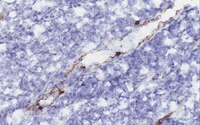CBL180-I Sigma-AldrichAnti-CD62E [ELAM-1] Antibody, clone 1.2B6
Anti-CD62E [ELAM-1] Antibody, clone 1.2B6 is an antibody against CD62E [ELAM-1] for use in Immunohistochemistry, ELISA, Flow Cytometry, Western Blotting, Activity Assay.
More>> Anti-CD62E [ELAM-1] Antibody, clone 1.2B6 is an antibody against CD62E [ELAM-1] for use in Immunohistochemistry, ELISA, Flow Cytometry, Western Blotting, Activity Assay. Less<<Recommended Products
Overview
| Replacement Information |
|---|
Key Specifications Table
| Species Reactivity | Key Applications | Host | Format | Antibody Type |
|---|---|---|---|---|
| H | IHC, ELISA, FC, WB, ACT | M | Purified | Monoclonal Antibody |
| References |
|---|
| Product Information | |
|---|---|
| Format | Purified |
| Presentation | Purified mouse monoclonal IgG1κ antibody in PBS without preservatives. |
| Quality Level | MQ100 |
| Physicochemical Information |
|---|
| Dimensions |
|---|
| Materials Information |
|---|
| Toxicological Information |
|---|
| Safety Information according to GHS |
|---|
| Safety Information |
|---|
| Packaging Information | |
|---|---|
| Material Size | 100 μg |
| Transport Information |
|---|
| Supplemental Information |
|---|
| Specifications |
|---|
| Global Trade Item Number | |
|---|---|
| Catalog Number | GTIN |
| CBL180-I | 04055977312492 |
Documentation
Anti-CD62E [ELAM-1] Antibody, clone 1.2B6 SDS
| Title |
|---|
Anti-CD62E [ELAM-1] Antibody, clone 1.2B6 Certificates of Analysis
| Title | Lot Number |
|---|---|
| Anti-CD62E [ELAM-1], clone 1.2B6 - 3419578 | 3419578 |
| Anti-CD62E [ELAM-1], clone 1.2B6 - 3977306 | 3977306 |
| Anti-CD62E [ELAM-1], clone 1.2B6 - 4203371 | 4203371 |
| Anti-CD62E [ELAM-1], clone 1.2B6 -Q2639556 | Q2639556 |







